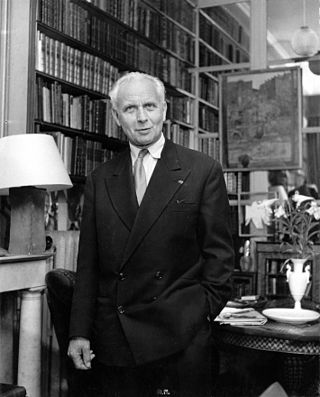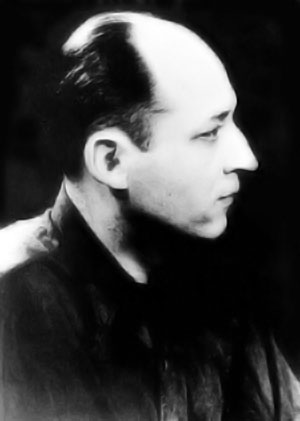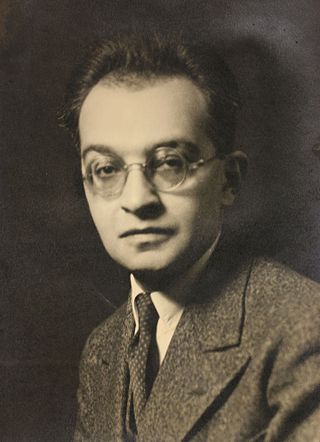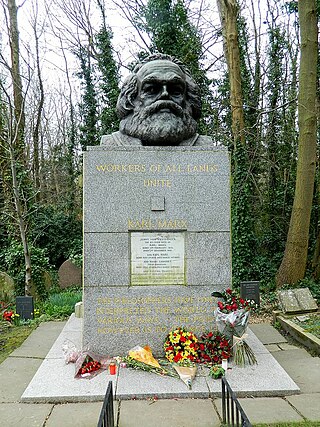Related Research Articles

Lev Davidovich Bronstein, better known as Leon Trotsky, was a Russian revolutionary, political theorist and politician. Ideologically a Marxist, his developments to the ideology are called Trotskyism.

Leninism is a political ideology developed by Russian Marxist revolutionary Vladimir Lenin that proposes the establishment of the dictatorship of the proletariat led by a revolutionary vanguard party as the political prelude to the establishment of communism. The function of the Leninist vanguard party is to provide the working classes with the political consciousness and revolutionary leadership necessary to depose capitalism in the Russian Empire (1721–1917). Leninist revolutionary leadership is based upon The Communist Manifesto (1848), identifying the communist party as "the most advanced and resolute section of the working class parties of every country; that section which pushes forward all others." As the vanguard party, the Bolsheviks viewed history through the theoretical framework of dialectical materialism, which sanctioned political commitment to the successful overthrow of capitalism, and then to instituting socialism; and, as the revolutionary national government, to realise the socio-economic transition by all means.

Trotskyism is the political ideology and branch of Marxism developed by Ukrainian-Russian revolutionary Leon Trotsky and some other members of the Left Opposition and Fourth International. Trotsky described himself as an orthodox Marxist, a revolutionary Marxist, and Bolshevik–Leninist, a follower of Marx, Engels, and 3L: Vladimir Lenin, Karl Liebknecht, and Rosa Luxemburg. He supported founding a vanguard party of the proletariat, proletarian internationalism, and a dictatorship of the proletariat based on working-class self-emancipation and mass democracy. Trotskyists are critical of Stalinism as they oppose Joseph Stalin's theory of socialism in one country in favour of Trotsky's theory of permanent revolution. Trotskyists criticize the bureaucracy and anti-democratic current developed in the Soviet Union under Stalin.

Louis Aragon was a French poet who was one of the leading voices of the surrealist movement in France. He co-founded with André Breton and Philippe Soupault the surrealist review Littérature. He was also a novelist and editor, a long-time member of the Communist Party and a member of the Académie Goncourt. After 1959, he was a frequent nominee for the Nobel Prize in Literature.

The Fourth International Posadist is a Trotskyist international. It was founded in 1962 by J. Posadas, who had been the leader of the Latin America Bureau of the Fourth International in the 1950s, and of the Fourth International's section in Argentina. Between their split from the International Secretariat of the Fourth International in 1962 and Posadas' death in 1981, Posadists developed a strain of communism that included several fringe ideas, which brought them into conflict with more mainstream left-wing groups.

Benjamin Péret was a French poet, Parisian Dadaist and a founder and central member of the French Surrealist movement with his avid use of Surrealist automatism.

René Crevel was a French writer involved with the surrealist movement.
The Communist League was one of the first Trotskyist groups in Britain, formed in 1932 by members of the Communist Party of Great Britain in South London, including Harry Wicks, who had been expelled after forming a loose grouping inside the CPGB known as the Balham Group. This became the British Section of the International Left Opposition and adopted the name Communist League in June 1933. They published a monthly newspaper, Red Flag, and a quarterly journal, The Communist.
Paul Nougé was a Belgian poet, founder and theoretician of surrealism in Belgium, sometimes known as the "Belgian Breton".

Pierre Broué was a French historian and Trotskyist revolutionary militant whose work covers the history of the Bolshevik Party, the Spanish Revolution and biographies of Leon Trotsky.
Pierre Naville was a French Surrealist writer and sociologist. He was a prominent member of the "Investigating Sex" group of Surrealist thinkers.
The Marxist Group was an early Trotskyist group in the United Kingdom.

Boris Souvarine, also known as Varine, was a French Marxist, communist activist, essayist and journalist.
Boris Georgiyevich Bazhanov was a Soviet secretary of the Secretariat of the Communist Party of the Soviet Union who defected from the Soviet Union on 1 January 1928.

Jacques Numa Sadoul, commonly known as Captain Sadoul, was a French lawyer, communist politician, and writer, one of the founders of the Communist International. He began his career in the French Section of the Workers' International (SFIO) in Vienne, and, by the time of World War I, was serving under Albert Thomas, the Minister of Armaments. A French Army Captain, he was Thomas' envoy to the Russian Republic, keeping contact with the socialist circles and steering them toward the Entente Powers. After the October Revolution, he maintained close contacts with the Bolsheviks, pledging them his support against the Central Powers during the crisis of 1917–1918. He was unable to prevent Bolshevist Russia from signing the Treaty of Brest-Litovsk, which took her out of the war, but, having established close contacts with Leon Trotsky and other communist leaders, became a communist himself.
The Left Opposition was a faction within the Russian Communist Party (b) from 1923 to 1927 headed de facto by Leon Trotsky. The Left Opposition formed as part of the power struggle within the party leadership that began with the Soviet founder Vladimir Lenin's illness and intensified with his death in January 1924. Originally, the battle lines were drawn between Trotsky and his supporters who signed The Declaration of 46 in October 1923 on the one hand and a triumvirate of Comintern chairman Grigory Zinoviev, Communist Party General Secretary Joseph Stalin and Politburo chairman Lev Kamenev on the other hand.

The Communist League of America (Opposition) was founded by James P. Cannon, Max Shachtman and Martin Abern late in 1928 after their expulsion from the Communist Party USA for Trotskyism. The CLA(O) was the United States section of Leon Trotsky's International Left Opposition and initially positioned itself as not a rival party to the CPUSA but as a faction of it and the Comintern. The group was terminated in 1934 when it merged with the American Workers Party headed by A. J. Muste to establish the Workers Party of the United States.

The Workers Group of the Russian Communist Party was formed in 1923 to oppose the excessive power of bureaucrats and managers in the new soviet society and in the Communist Party. Its leading member was Gavril Myasnikov.
Magdeleine Paz was a French journalist, translator, writer and activist. She was one of the leading left-wing intellectuals in the interwar period. For a time she belonged to the French Communist Party, but she was expelled due to her support of Leon Trotsky. She was the driving force in the campaign to have Victor Serge released from prison in Russia and allowed to return to the west. She wrote a number of books, and translated several others.

Far-left politics in the United Kingdom have existed since at least the 1840s, with the formation of various organisations following ideologies such as Marxism, revolutionary socialism, communism, anarchism and syndicalism.
References
- ↑ Alexander, Robert J. International Trotskyism, 1929-1985: A Documented Analysis of the Movement . Durham: Duke University Press, 1991. p. 94
- 1 2 Nomenclature des journaux & revues en langue française du monde entier . Paris, Les bureaux de l'Argus, 1937. p. 495
- ↑ Durand, Damien. Opposants à Staline: l'opposition de gauche internationale et Trotsky (1929-1930) . [Grenoble]: Pensée sauvage, 1988. p. 36